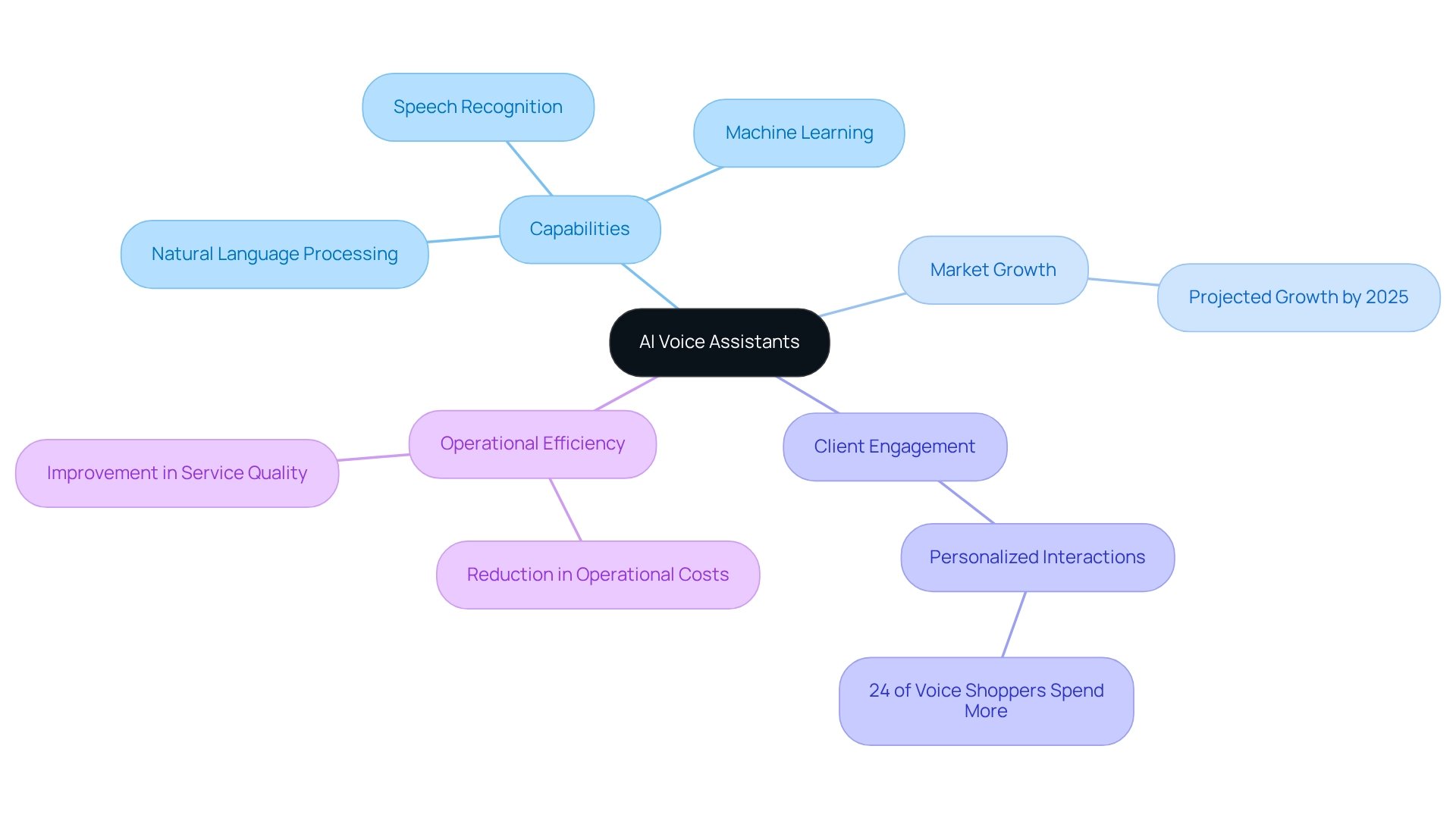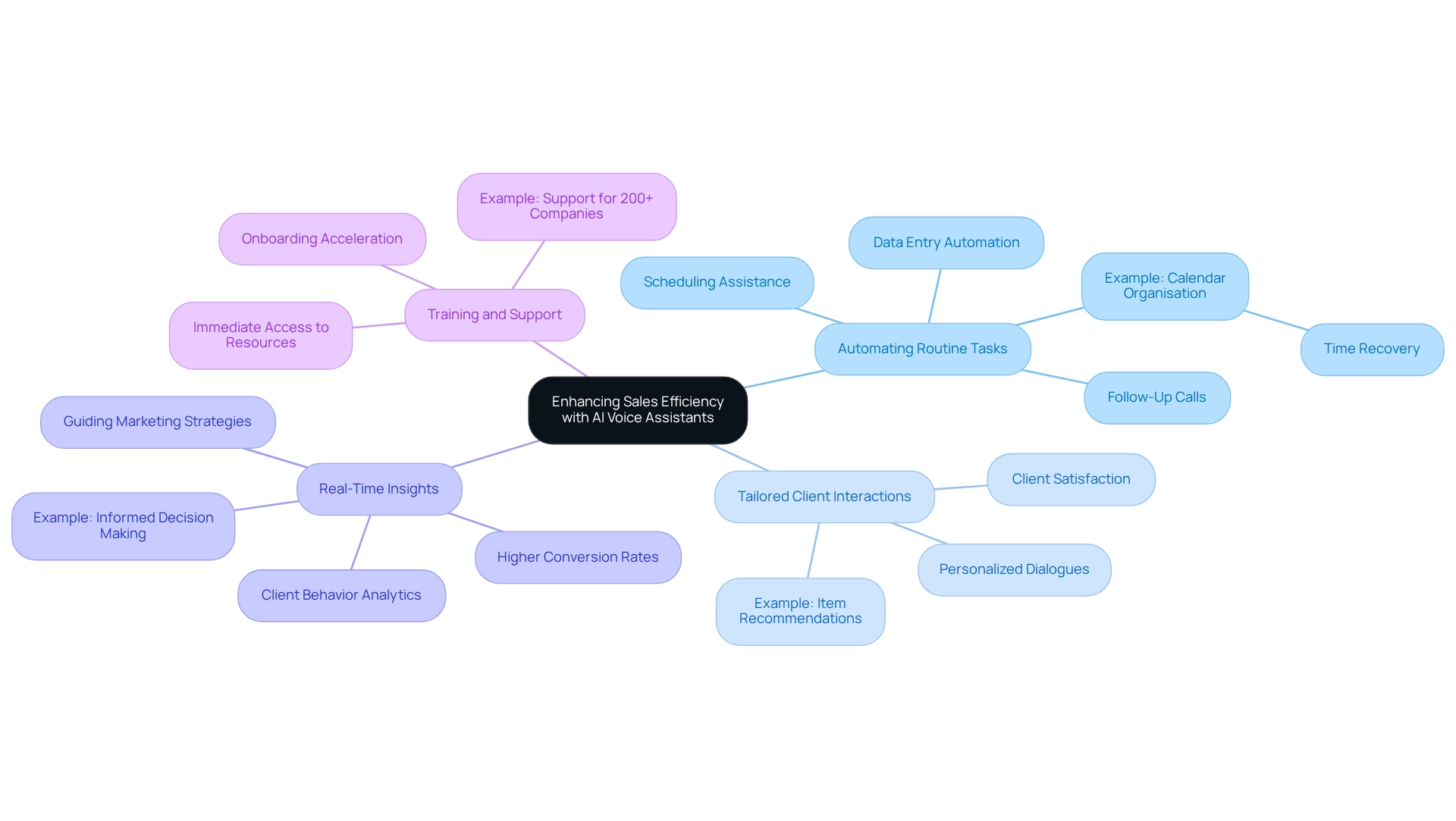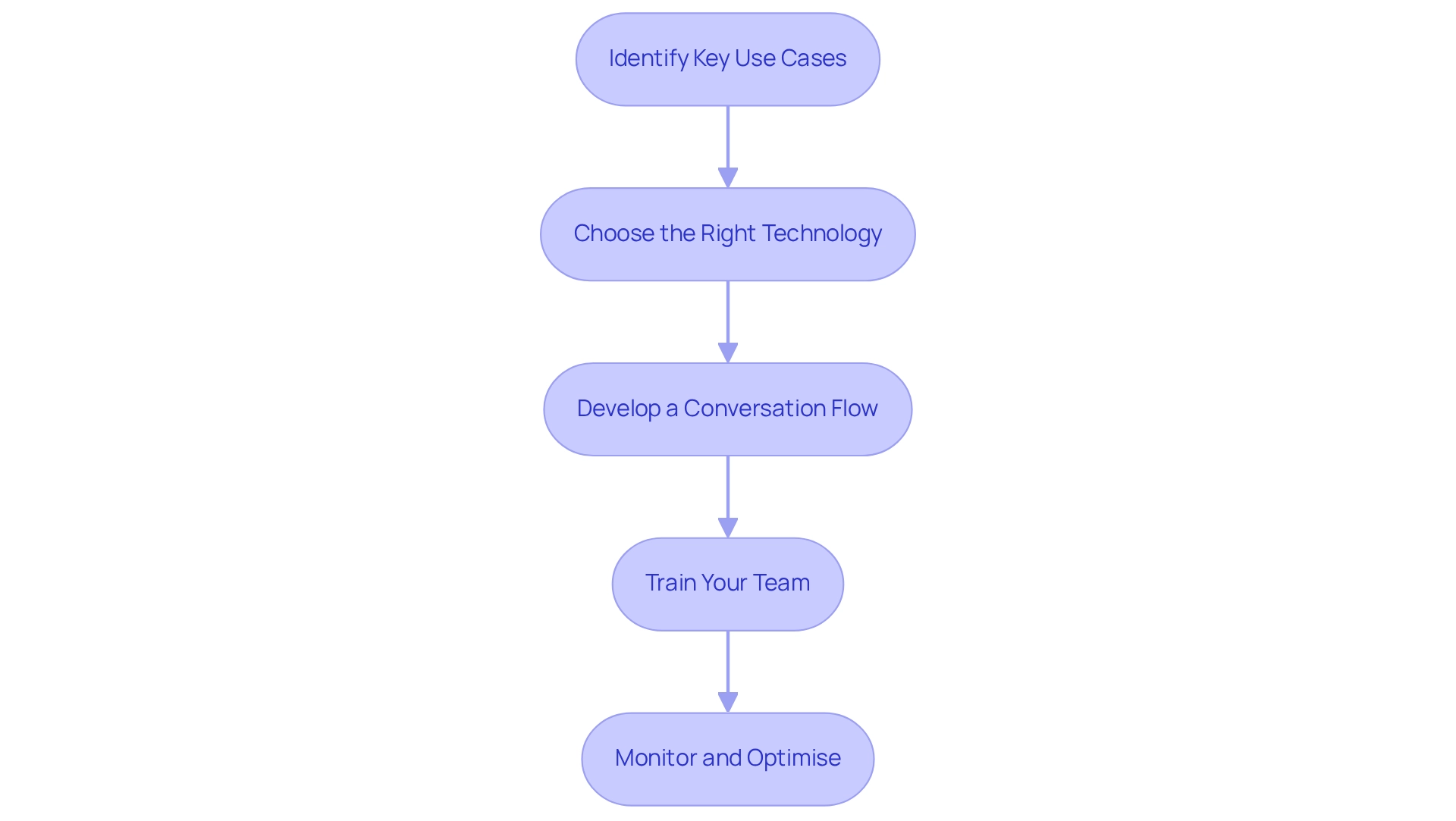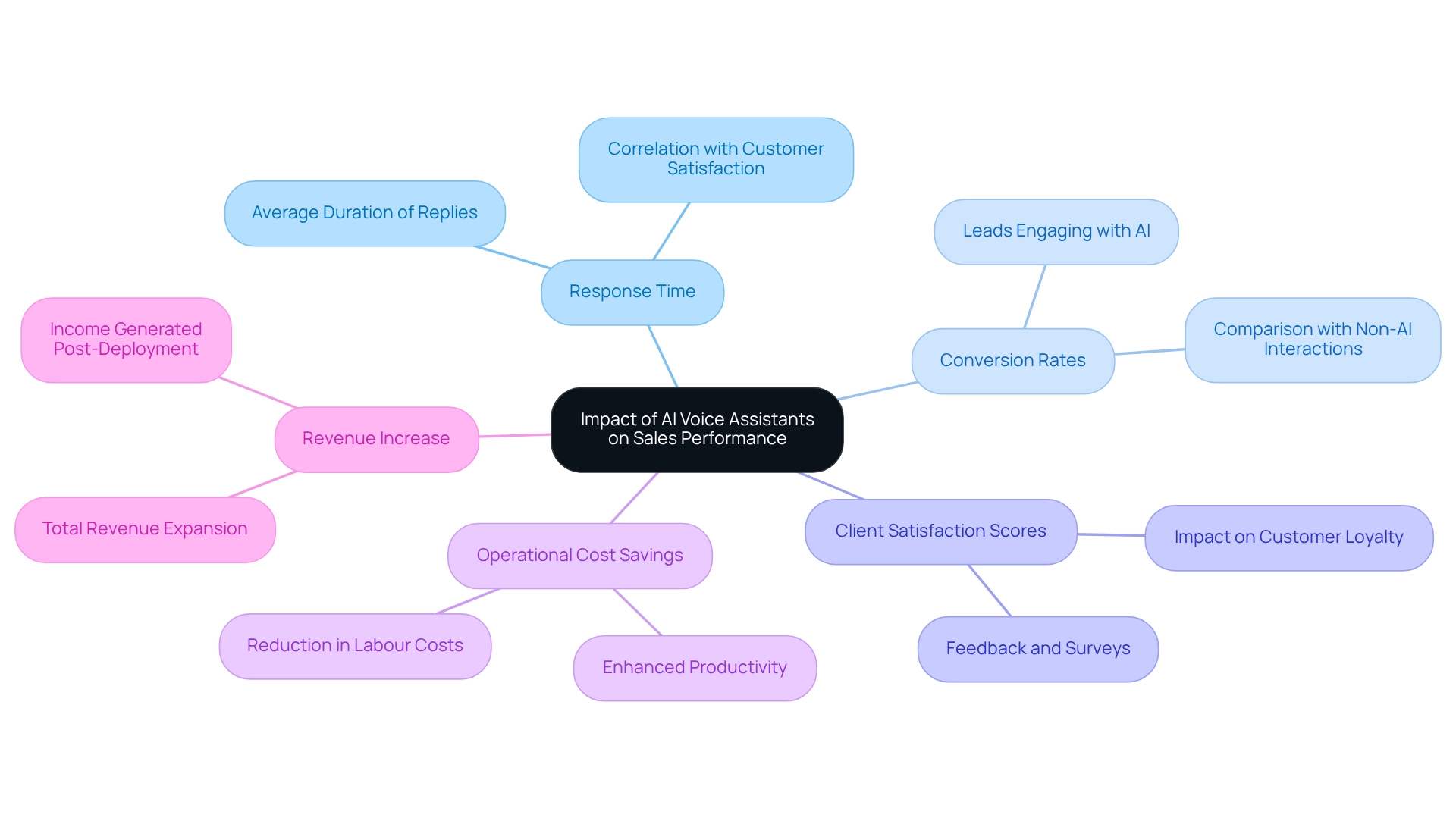
Harness AI Voice Assistant for Sales Efficiency and Growth
GeneralKey Highlights:
- AI voice assistants utilise natural language processing, machine learning, and speech recognition to improve business communication.
- They can automate tasks like scheduling, client inquiries, and product recommendations, enhancing efficiency and client engagement.
- The market for AI voice assistants is expected to grow significantly by 2025, making understanding their functionalities crucial for sales teams.
- Personalised interactions through AI can lead to increased customer satisfaction and sales opportunities, with 24% of audio shoppers spending more than planned.
- AI voice assistants help reduce operational costs by managing routine inquiries, allowing human agents to focus on complex tasks.
- Strategic implementation of AI voice assistants can optimise sales processes, improve client interactions, and foster growth.
- Key areas for AI implementation include automating routine tasks, tailoring client interactions, providing real-time insights, and supporting training.
- Effective integration involves identifying use cases, choosing suitable technology, developing conversation flows, training teams, and ongoing monitoring.
- Key performance indicators to measure the impact of AI voice assistants include response time, conversion rates, client satisfaction scores, operational cost savings, and revenue increases.
- Regular assessment of these KPIs is essential for evaluating the effectiveness of AI voice assistants in enhancing sales performance.
Introduction
In the rapidly evolving landscape of business communication, AI voice assistants are emerging as powerful allies that transform how organisations interact with their customers. Harnessing advanced technologies such as natural language processing and machine learning, these tools manage a plethora of tasks—from scheduling to delivering personalised product recommendations. As the market for AI voice assistants is set for substantial growth, understanding their capabilities is essential for sales teams aiming to boost efficiency and enhance customer engagement. The potential to increase revenue and improve service quality positions the integration of AI voice assistants not merely as a trend; it is a strategic move that can redefine success in sales.
Understand AI Voice Assistants and Their Capabilities
AI voice assistants represent a significant advancement in business communication, leveraging natural language processing (NLP), machine learning, and speech recognition to effectively comprehend and respond to human speech. These sophisticated tools, such as the AI voice assistant, are capable of managing a wide array of tasks, from scheduling meetings and addressing client inquiries to providing tailored product recommendations. With the AI voice assistant market projected for substantial growth by 2025, understanding their functionalities is essential for sales teams aiming to enhance efficiency and client engagement.
Recent developments in the AI voice assistant technology have empowered them to analyse client data, fostering personalised interactions that result in heightened satisfaction and expanded sales opportunities. Notably, statistics reveal that 24% of audio shoppers tend to spend more than initially planned, underscoring the potential for increased revenue through effective audio interactions. Moreover, companies adopting these technologies can expect a reduction in operational costs and an improvement in service quality, as the AI voice assistant manages routine inquiries, allowing human agents to focus on more complex challenges.
‘Agentics’ AI voice assistant solutions exemplify these advancements, offering customised features that enhance client interaction and operational efficiency. The effective application of an AI voice assistant in business communication has demonstrated a remarkable ability to significantly boost client engagement. Organisations that prioritise responsible AI deployment, addressing trust and ethical considerations, are likely to cultivate stronger client loyalty. As the landscape of commerce continues to evolve, embracing AI voice assistants as communication tools will be imperative for companies striving to remain competitive and responsive to client needs.

Leverage AI Voice Assistants to Enhance Sales Efficiency
To enhance sales efficiency, organisations can strategically implement AI voice assistants across several key areas:
- Automating Routine Tasks: AI speech helpers excel at automating repetitive activities such as data entry, scheduling, and follow-up calls. This not only saves valuable time but also minimises human error. For example, a sales group employing an AI tool for calendar organisation can recover hours each week, enabling them to focus on finalising agreements. Agentics provides tailored Voice AI solutions that seamlessly integrate into existing workflows, maximising efficiency.
- Tailored Client Interactions: By utilising client information, tailored dialogues can be achieved through AI voice assistants to match specific needs. This level of personalisation fosters enhanced satisfaction and loyalty among clients. For instance, an AI helper can recommend items based on a buyer’s past acquisitions, significantly improving the shopping experience. Agentics’ solutions are designed to analyse client interactions, ensuring that each engagement is relevant and impactful.
- AI voice assistants provide sales groups with real-time insights and analytics into client behaviour and preferences. This data-focused method guides marketing strategies and assists in prioritising leads more effectively. Companies employing these insights frequently report higher conversion rates and enhanced customer lifetime value. Agentics provides sophisticated analytics tools that enable teams to make informed choices in real-time.
- Training and Support: AI voice assistants can also serve as training instruments for new sales personnel, providing immediate access to information and resources. This capability accelerates the onboarding process and ensures that all team members are well-equipped with the knowledge necessary for success. Agentics assists more than 200 companies in enhancing their support services with Voice AI, showcasing its reliability and expertise in successfully applying these technologies.
By strategically utilising an AI voice assistant, sales groups can optimise processes, improve client interaction, and ultimately foster expansion. Remarkably, entities that have embraced these technologies are experiencing substantial enhancements in efficiency and customer loyalty, with many indicating a notable rise in overall performance.

Integrate AI Voice Assistants into Your Sales Workflow
To seamlessly integrate AI voice assistants into your sales workflow, follow these essential steps:
-
Identify Key Use Cases: Start by identifying specific tasks within your selling process that can benefit from automation. Common applications include lead qualification, appointment scheduling, and client follow-ups—each of which significantly enhances efficiency.
-
Choose the Right Technology: Opt for an AI voice assistant that aligns with your business objectives and integrates effortlessly with your current CRM and marketing tools. Emphasise features such as natural language understanding, multi-channel support, and robust analytics capabilities to maximise effectiveness.
-
Develop a Conversation Flow: Construct a comprehensive conversation flow for the AI assistant, ensuring it can adeptly manage various customer scenarios. This entails scripting responses for frequently asked questions and establishing pathways for more intricate interactions that may require human intervention.
-
Train Your Team: Equip your sales team with the necessary training to effectively utilise the AI communication tool. This training should encompass the tool’s capabilities, how to interpret insights generated, and guidelines for engaging in human interaction when needed.
-
Monitor and Optimise: Post-implementation, continuously assess the effectiveness of the AI audio assistant. Solicit feedback from both your sales personnel and clients to identify areas for enhancement. Regularly update conversation flows and features based on this feedback to ensure ongoing improvement and effectiveness.
By adhering to these steps, teams can facilitate a smooth integration of AI voice assistants into their workflows, ultimately leading to enhanced efficiency and improved client satisfaction.

Measure the Impact of AI Voice Assistants on Sales Performance
To effectively evaluate the impact of AI voice assistants, such as those offered by Agentics, on your sales process, it is essential to focus on the following key performance indicators (KPIs):
-
Response Time: Assess the average duration required by the AI helper to reply to client inquiries. A decrease in response time signifies improved efficiency and correlates with higher customer satisfaction levels.
-
Conversion Rates: Monitor the conversion rates of leads engaging with the AI voice tool compared to those who do not. An uptick in conversion rates highlights the effectiveness of personalised interactions facilitated by Agentics’ AI, showcasing its potential to drive sales.
-
Client Satisfaction Scores: Utilise client feedback and satisfaction surveys to evaluate the quality of interactions handled by the AI helper. High satisfaction scores indicate successful engagement and support, which are essential for fostering customer loyalty.
-
Operational Cost Savings: Examine the reduction in operational expenses associated with the implementation of AI speech helpers from Agentics. This includes savings from decreased labour costs and enhanced productivity, which can significantly impact the bottom line.
-
Revenue Increase: Monitor the total revenue expansion and income generated after the deployment of Agentics’ AI communication tools. A favourable trend in revenue is often linked to the enhanced efficiency and effectiveness resulting from AI integration.
Regularly measuring these KPIs allows organisations to assess the tangible impact of AI voice assistants on sales performance, which enables informed decisions regarding future investments in AI voice assistant technologies. With 47% of consumers open to purchasing through AI-driven chatbots, the potential for revenue generation is substantial, making it imperative for businesses to harness these tools effectively. Furthermore, customising AI agents from Agentics is crucial for ensuring consistent brand messaging and adherence to company policies, significantly enhancing the effectiveness of AI interactions.

Conclusion
AI voice assistants are fundamentally transforming the landscape of business communication, providing organisations with a robust tool to enhance efficiency and elevate customer engagement. By automating routine tasks, personalising interactions, and delivering real-time insights, these advanced solutions empower sales teams to concentrate on what truly matters—closing deals and cultivating relationships. The integration of AI voice assistants not only streamlines operations but also nurtures a more responsive and customer-centric approach, resulting in heightened satisfaction and loyalty.
As businesses confront the intricacies of modern sales environments, the strategic adoption of AI voice assistants becomes essential. Identifying pivotal use cases, selecting the appropriate technology, and continuously refining performance are critical steps for successful implementation. By harnessing the capabilities of AI, organisations can drive growth and position themselves as frontrunners in customer service excellence.
Ultimately, the potential of AI voice assistants transcends mere automation; they signify a transformative shift in how businesses engage with their customers. Embracing these technologies is not merely a trend but an imperative evolution in sales practises. As the market continues to expand, organisations that leverage the power of AI voice assistants will be well-prepared to thrive in an increasingly competitive landscape, ensuring they not only meet but exceed customer expectations while achieving their business objectives.
Frequently Asked Questions
What are AI voice assistants and their main capabilities?
AI voice assistants are advanced tools that utilise natural language processing (NLP), machine learning, and speech recognition to understand and respond to human speech. They can manage tasks such as scheduling meetings, addressing client inquiries, and providing tailored product recommendations.
How is the AI voice assistant market expected to grow?
The AI voice assistant market is projected for substantial growth by 2025, indicating increasing adoption and integration within business communication.
How do AI voice assistants enhance client interactions?
Recent advancements in AI voice assistant technology enable them to analyse client data, fostering personalised interactions that lead to higher satisfaction and expanded sales opportunities.
What impact do AI voice assistants have on sales?
Statistics show that 24% of audio shoppers tend to spend more than initially planned, highlighting the potential for increased revenue through effective audio interactions facilitated by AI voice assistants.
What are the operational benefits of using AI voice assistants?
Companies that adopt AI voice assistants can expect reduced operational costs and improved service quality, as these assistants handle routine inquiries, allowing human agents to focus on more complex challenges.
What features do ‘Agentics’ AI voice assistant solutions offer?
‘Agentics’ AI voice assistant solutions provide customised features that enhance client interaction and operational efficiency.
How do AI voice assistants contribute to client engagement?
The effective application of AI voice assistants in business communication has shown a significant ability to boost client engagement.
What ethical considerations are important for AI voice assistant deployment?
Organisations that prioritise responsible AI deployment, addressing trust and ethical considerations, are likely to cultivate stronger client loyalty.
Why is it important for companies to embrace AI voice assistants?
As the landscape of commerce evolves, embracing AI voice assistants as communication tools is essential for companies aiming to remain competitive and responsive to client needs.
Enjoyed this post? Share it with your network!
10 Best AI Sales Tools to Boost Your Team’s Performance

Discover the top 10 best AI sales tools to enhance team performance and drive revenue growth.
Mastering Test Call Numbers: A Step-by-Step Guide for Sales Directors

Elevate your communication with our guide on mastering test call numbers for sales success.
7 Ways Automated Outbound Calls Boost Sales Performance

Discover how automated outbound calls enhance sales performance and streamline communication.
